| Article ID | Journal | Published Year | Pages | File Type |
|---|---|---|---|---|
| 451405 | Computer Networks | 2007 | 21 Pages |
Increasing onboard processing capabilities of sensors enable self-organization in wireless sensor networks to dynamically adapt to ad hoc topologies and to react to task or network changes. Such self-organization, however. comes at a cost of additional energy consumption for the sensor nodes with already limited power resources. As energy limitations in unattended environments raise a major concern, such organizations need to trade-off between power consumption and topology maintenance. In this paper we present our adaptive energy-efficient registration and online scheduling (AEROS) protocol that exploits application based data flow characteristics to reduce power consumption during self-organization. Asymmetric data flow characteristics is used to govern route selection, and to formulate an organized transmission schedule with risk-free sleeping time. Our simulation results suggest that AEROS’s transmission schedule allows the minimum number of data message exchanges and guarantees a collision-free communication. AEROS provides significant energy savings in steady state using a low number of control messages.
